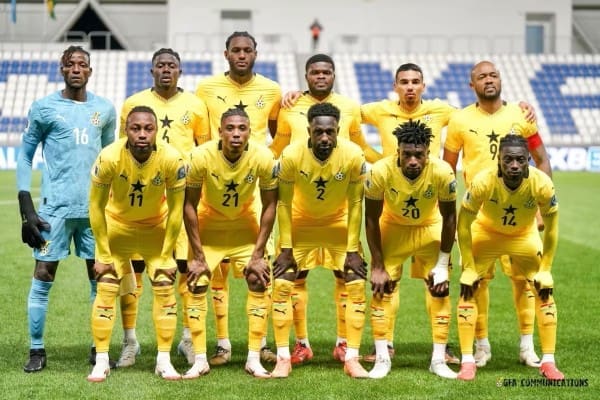Ghana’s Black Stars have relocated from their Casablanca training base to Meknes ahead of Wednesday’s critical 2026 FIFA World Cup qualifier against the Central African Republic, a match that could edge them closer to securing a fifth World Cup appearance.
The team spent several days in Casablanca fine tuning preparations before making the move to Meknes, where the match will be played at a neutral venue after FIFA changed the game location from the originally scheduled Stade El Abdi in El Jadida. The Central African Republic chose Morocco as the host country for what is officially their home fixture.
Ghana enters the penultimate Group I qualifier sitting atop the standings with 19 points from seven matches, having won six, drawn one, and lost just once. That position puts the Black Stars in the driver’s seat for automatic qualification, though Madagascar trails by only three points with 16, and Comoros remains in contention with 15 points.
The mathematics are straightforward but not yet secure. Only the group winner qualifies directly for the 2026 World Cup, which will be hosted across the United States, Canada, and Mexico. The runner up gets a chance to compete in a second round playoff that could lead to inter confederation playoffs, but that path offers no guarantees.
Ghana’s recent form suggests momentum heading into the crucial stretch. The Black Stars defeated Mali 1 to 0 in their last qualifier, with defender Alexander Djiku scoring the decisive goal in the 49th minute. Before that, they drew 1 to 1 with Chad, results that positioned them favorably but left the door open for Madagascar or Comoros to catch up if Ghana stumbles.
The first leg meeting between Ghana and the Central African Republic ended 4 to 3 in Ghana’s favor when the teams met in Kumasi, an unexpectedly high scoring affair that revealed defensive vulnerabilities on both sides. Les Fauves will be eager to avoid repeating that defeat, especially with the match being played on what they consider home territory despite the Moroccan location.
Wednesday’s match kicks off at 16:00 GMT, giving Ghana a chance to potentially seal qualification with one match remaining or at minimum maintain their cushion over the chasing pack. A win would put Ghana on 22 points with only the final group match against Comoros remaining, making it nearly impossible for rivals to overtake them.
However, a loss or draw would invite renewed pressure. Madagascar faces Comoros on matchday nine in a direct competition between the second and third placed teams, meaning Ghana cannot afford to drop points while their competitors battle each other for position.
The Black Stars then wrap up their qualifying campaign on home soil against Comoros at the Accra Sports Stadium on Sunday, October 12, 2025. That final match could range from a celebration of qualification already secured to a tense must win situation depending on Wednesday’s result against the Central African Republic.
Ghana has not qualified for the World Cup since 2014 in Brazil, missing out on both the 2018 tournament in Russia and the 2022 edition in Qatar. That eight year absence from football’s biggest stage has created mounting pressure on coach Otto Addo and his squad to end the drought.
The 2026 World Cup will be the first with an expanded format of 48 teams, up from 32, giving African nations nine automatic qualification spots plus the possibility of a tenth through playoffs. That expansion theoretically makes qualification easier, but Ghana’s struggles in previous cycles demonstrated that nothing can be taken for granted in African football.
The decision to base the team in Casablanca for training before moving to Meknes for the match reflects careful logistical planning. Casablanca offers better training facilities and accommodations, while Meknes provides the match venue without the extended travel that might have been required if the Central African Republic had chosen a different neutral site.
Morocco has become a popular neutral venue choice for African teams whose home stadiums don’t meet FIFA standards or who prefer to play on better surfaces with superior facilities. The North African nation’s football infrastructure benefited from their hosting of multiple international tournaments and their successful 2022 World Cup campaign that saw them reach the semifinals.
For Ghana, the task is clear: secure maximum points against the Central African Republic to move within touching distance of World Cup qualification, then finish the job at home against Comoros. Anything less risks squandering a favorable position and potentially extending the World Cup absence that has frustrated Ghanaian football fans for nearly a decade.
The Black Stars’ performance on Wednesday will reveal whether they have learned from past qualification failures or are destined to make the expanded World Cup format work harder than expected to reach football’s grandest stage.
Source: newsghana.com.gh











